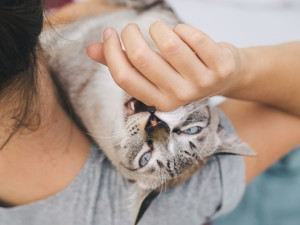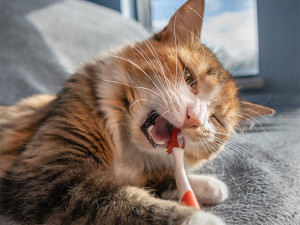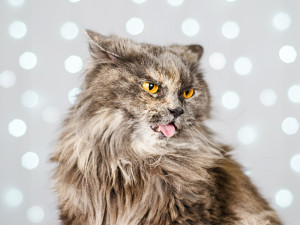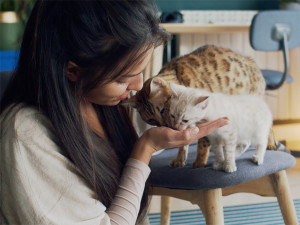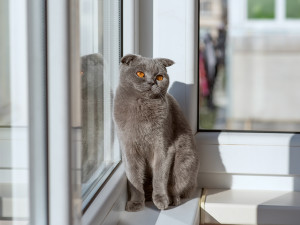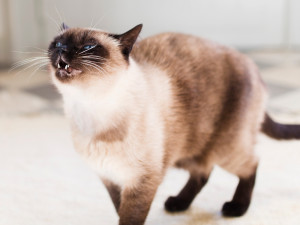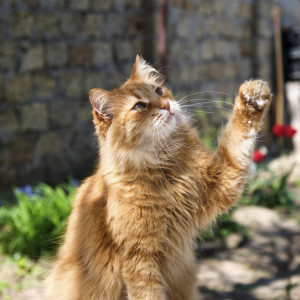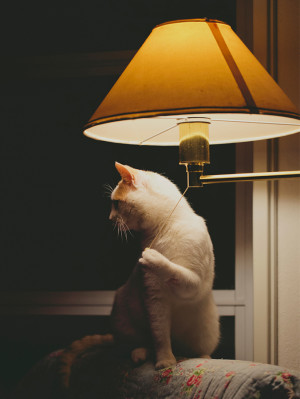Why Does My Cat Drool?
Dogs rule, cats drool. Like, that’s normal, right?
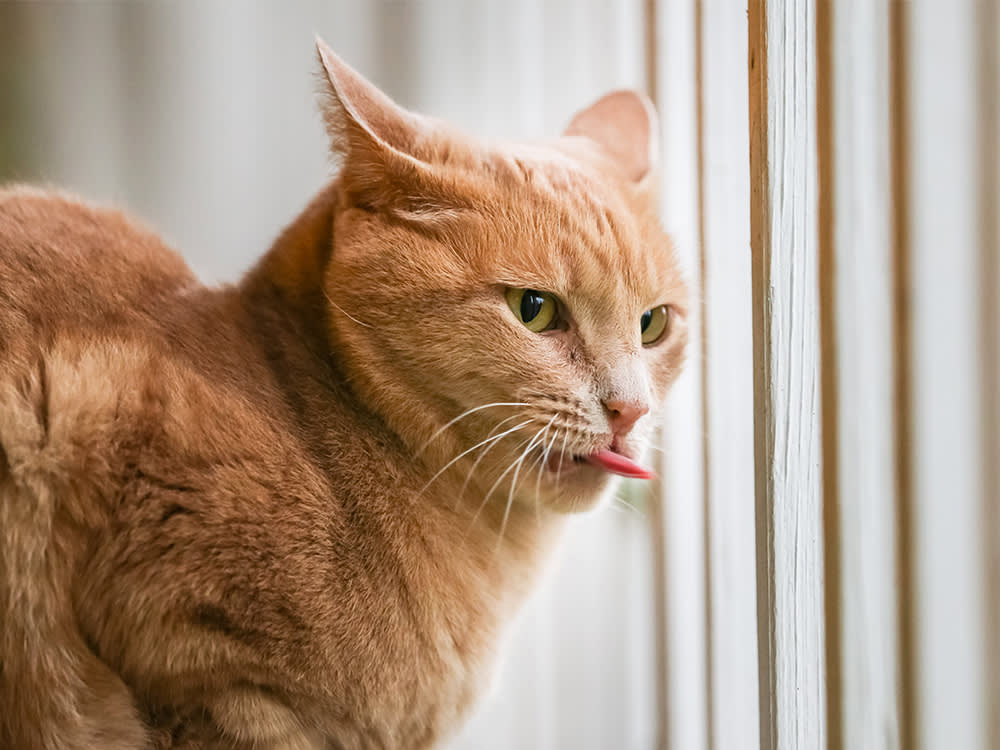
Share Article
In This Article:
Why is My Cat Drooling?opens in a new tab Home Remedies for Cat Droolingopens in a new tab
We expect some level of drooling from dogs — especially the jowly ones. But a cat with ropes of saliva dangling from their face? That doesn’t quite fit with the sophisticated aesthetic cats have worked so hard to develop. And you’re right to be a little concerned: Although cat drooling has some benign causes, it may also indicate a more serious health issue.

littleKin™ is Kinship’s home just for puppy and kitten parents. Bop over to check out expert advice, new pet tools, and special deals—all curated for your newest family member.
opens in a new tabWhy is my cat drooling?
Here are some reasons why your cat may be drooling (most of which warrant a trip to the vet).
Stings
Check inside the cat’s mouth and around the face and neck for any swellings or signs of being stung by an insect, wasp or bee.
Broken tooth or injury inside the mouth
Cats will drool with any pain from inside the mouth; this can include traumatic injuries or may even be from a foreign body wedged in the roof of the mouth or stuck in the throat.
Reaction
Cats will react by drooling if they have licked anything off their coat during grooming; this can include flea treatments, chemicals in the garden, toxic plants, creosote, paint, antifreeze, and poisons.
Oral irritation
Curious cats will often investigate their environment with their mouthsopens in a new tab. This exploration can lead to tasting different house plants, insects, liquids, and household items. Some common toxic indoor plantsopens in a new tab, such as elephant ears, fiddle-leaf figs, and dieffenbachia (aka dumb cane plants), contain oxalates, which are small crystals that cause oral irritation on contact.
Licking caustic substances like household cleaners opens in a new taband chemicals can produce painful ulcers on a cat’s gums and tongue. And chewing on electrical cords can cause electrical shock, but drooling due to burns in the mouth may be the only sign that all is not well. Unless you catch your cat chewing cords chronically, here are some other potential causes.
Periodontal disease
Cats naturally have many bacteria in their mouths. The bacteria on the teeth form an off-white, sticky layer called dental plaque. If the plaque isn’t removed, it hardens to form tartar (a brown, rough deposit on the teeth) within days. The bacteria within plaque and tartar attack the gums and cause inflammation of the gum tissue. Plaque damages the gum tissues and then the other structures which attach the teeth (such as ligaments and bone). This is a painful process and if left untreated, the tooth will become loose and eventually “fall out.” Cats are stoic animals and they hide pain well; providing an oral care regime at home and having your pet’s mouth checked regularly by your vet or vet nurse can help to prevent this condition.
Without treatment, the bacteria travel deeper and damage the supporting structures of the tooth. This is known as periodontitis. This condition is irreversible and needs dental treatment by a veterinarian.
Stomatitis
Cats can also develop stomatitis. Cats with stomatitis experience inflammation and ulceration of the gums, tongue, and cheeks. As you can imagine, kitties with periodontal disease and/or stomatitis experience oral pain that can lead to drooling and difficulty eating.
Esophagitis
Esophagitis can develop when material gets stuck in a cat’s esophagus or causes irritation on the way down to the stomach. This esophageal irritation can also occur with acid reflux or after repeated vomiting. Inflammation of the esophagus can make swallowing painful and can cause cats to stop eating to avoid this pain. Even with normal saliva production, cats may opt to let the saliva fall out of their mouths rather than deal with the discomfort of swallowing.
Medication
Medicating cats can involve a lot of dramaopens in a new tab — chasing them around the house, finding them hiding under the bed, avoiding claws and teeth. It’s no fun for you or your cat. For some medications, no amount of tuna flavoring will cover the bitter taste completely, and your cat will be more than happy to show their displeasure by foaming, drooling, and trying to spit it out in the most dramatic way possible. Certain eyedrops may cause drooling, too, because tear ducts drain to the back of the throat.
Nausea
Signs of nausea in both dogs and cats include poor appetiteopens in a new tab, lip smacking, drooling, and vocalizationopens in a new tab. Cats can become nauseated from eating something they shouldn’t have, intestinal obstruction, organ dysfunction, hairballs, car rides to the vet... the list goes on. Kitties experiencing motion sickness may start to hypersalivate before losing their lunch.
Salivary gland disease
Although more commonly diagnosed in dogs, salivary gland disease can lead to hypersalivation in cats too — but this condition is rare in cats. Cats have multiple salivary glands located near the jawline, in the cheeks, and under the tongue. Salivary gland disease can cause swelling, painful swallowing, difficulty eating, retching, gaggingopens in a new tab, or wheezing. These kitties can hypersalivate either from discomfort or an inability to swallow properly.
Pleasure
Cats may drool when they are in total bliss, like when they “make biscuits” with their paws. Kitties who are really enjoying cuddle timeopens in a new tab, sunbathing, or catnip euphoria may purr, drool, and relish how sweet it is to be a cat. It could indicate that they’re as happy as can be, but if your cat is drooling and lethargic or indicates discomfort, they may require a trip to the vet.
Home remedies for cat drooling
There aren’t many ways to truly prevent cat drooling at home — without cruelly restricting their catnip supply, anyway. If the drool is bothering you (I get it — it’s not pretty), you can put down a napkin on your lap before cuddle time with your cat.
Since nausea can cause drooling, preventing nausea — for example, by reducing the amount of time your cat spends in a car, if they’re prone to motion sickness — can lessen drooling. If your cat’s drooling after taking medication, encouraging them to hydrate can help.
If the drooling is excessive or your cat seems uncomfortable, don’t try to fix it at home. Get them to the vet. Treatment for pain or nausea can be administered by your vet to stop the cat drooling.
FAQs (People Also Ask)
Why is my cat drooling all of a sudden?
There are several reasons your cat may be drooling, including oral irritation, dental disease, esophagitis, medication, and nausea. They also could be feeling total bliss or a nice catnip highopens in a new tab. If your cat drools while kneading, they’re probably just happy.
What are home remedies for cat drooling?
Cat drooling may be unavoidable if your cat’s simply cozy. If the drooling is a problem and your cat is showing other signs of discomfort, a vet can get to the bottom of the issue.
Why does my cat drool when I pet him?
Cats sometimes drool when they’re super happy — like while cuddling or napping in the sun. If your cat’s drooling while you pet them, it could be because they’re feeling cozy and relaxedopens in a new tab.
References:

Dr. Alycia Washington, DVM, MS
Alycia Washington, DVM, is a small animal emergency veterinarian based in North Carolina. She works as a relief veterinarianopens in a new tab and provides services to numerous emergency and specialty hospitals. Dr. Washington is also a children’s book author and freelance writer with a focus on veterinary medicine. She has a special fondness for turtles, honey bees, and penguins — none of which she treats. In her free time, Dr. Washington enjoys travel, good food, and good enough coffee.
Related articles
![kittens licking woman's hand]() opens in a new tab
opens in a new tabCurious Cat Behavior: Why Does My Cat Lick Me?
Hey, everybody’s got their thing.
![Uncomfortable looking gray cat sitting on a window sill]() opens in a new tab
opens in a new tabShould Your Cat Go to the ER?
Here are six good reasons to haul tail to the emergency room.
![Siamese cat in the middle of sneeze]() opens in a new tab
opens in a new tabDid Your Cat Just Sneeze Like a Human Being? Here’s Why
Kitty sneezes can be alarming, but they’re not always cause for concern.
- opens in a new tab
Your Cat Is Limping. Now What?
When it’s no big deal and when you should worry.
![White cat switching on lamp on couch]() opens in a new tab
opens in a new tabWhy Does Your Cat Wake You Up at Night?
You want to sleep, your cat wants to party. Here’s how to deal.
![Cat kneading pet parent]() opens in a new tab
opens in a new tabWhy Does My Cat Knead Me?
Among other things, “making biscuits” is a sign of affection. We’re not crying…
